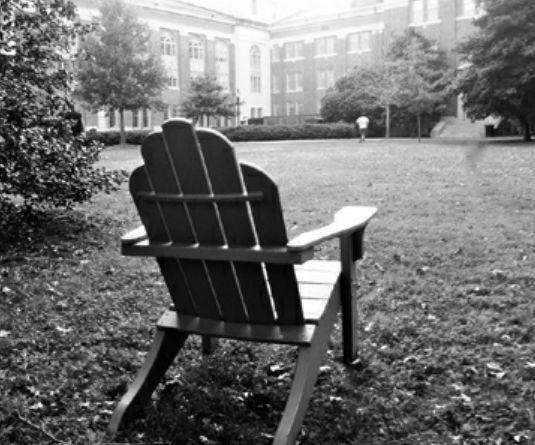为 “离巢”的孩子喝彩
by Michele Weldon
In mid-August I will be driving home in a van emptied of clothes, pillows, mini-fridge and plastic bins after dropping off my youngest son, Colin, at his dorm at the University of Iowa. It will be my ninth, solo-parent college dropoff: four times for my oldest son, Weldon, to the University of Wisconsin; four times for my middle son, Brendan, at the Ohio State University; Colins first.
Most people would say I have an empty nest. But I say, for the first time in 25 years it will be full of me. And for the record, my three sons are happy and ready to leave home. My oldest at 23 is already self-sufficient—living, working and earning a masters degree in Madrid, Spain. So for me, wishing to keep your children forever frozen in dependence, 2)thwarting their separation from you feels just plain wrong.
The U.S. National Center for Education Statistics states that 19.7 million Americans are headed to college this August and September, so supposedly millions of American parents will succumb to the woes of empty nest syndrome. While I love my sons, I find it selfish and unnatural to suspend, delay, or 3)impede their 4)forward momentum. Whose life is it anyway?
And it isnt just college that is a reason for leaving home. Many are beginning new lives—working, moving in with a partner or friends. According to the American Community Survey from the 2010 U.S. Census, 10 percent of the total population of 309 million Americans are young men and women 18-24 years old, representing roughly 31 million Americans. There are 114.5 million households in this country with children, or about one-third of all American households. Millions of those households will be“empty nests” for the first time.
And parents and adult children are 5)brainwashed to think this is a bad thing. Consider the 6)Verizon Droid commercial of the mother crying so hysterically over the fact that her daughter is moving “4.2 miles away,” that her blubbering requires subtitles.
Empty nesters are warned they will endure feelings of worthlessness and sorrow that one site declares takes 18 months to two years to 7)subside. Yes, children leaving home may affect many parents 8)deleteriously in a very real way. But considering the unemployment rate for 18-24-year-olds in this country is more than 15 percent, and the cost of college is prohibitive for many, arent the young adults who leave home for work or school the lucky ones?
All this parental 9)clinginess reminds me of the group Chicagos mid-70s song when as the youngest of six, I was off to college. The lyrics seem like a 10)contemporary parental empty nest anthem:
“If you leave me now / Youll take away the biggest part of me / No, baby please dont go.”
In her 2011 book, Empty Nest: How to Survive & Stay Close to Your Adult Child, British author Celia Dodd writes about the need to comfort all parents abandoned by grown children: “Where does that leave mothers—and increasingly fathers—who are devastated when their children leave, whether they work or not?”
This attitude may line up with the findings of a 2011 study by the Office for National Statistics in the United Kingdom, which shows a 20 percent increase in 20-34 year-olds living at home since 1997. More than three million Brits still live with mum and dad. Like their Italian 11)counterparts, called “Bamboccioni” or mostly male big babies, they live at home into their 30s, creating the generational and economic crisis of “mammisimo.” Are they staying home out of economic need or because they are afraid their parents will fall apart when they depart?
At 54, after 17 years as a single parent providing sole support, I am looking forward to being a spectator, not the managing director of my childrens lives. No matter what, I will never relinquish my completely impartial, cartoonishly robust, 12)insatiable love for my sons. They are welcome to come home if they have a problem. But I have always made it perfectly clear that optimally after graduating college they will maintain their own addresses. Brendan will graduate college in June 2013. Colin will graduate in 2016, returning home for breaks and summers and until he finds a job.
Earlier this summer I suggested Colin pick out a new paint color for the walls of his bedroom, assuming he wanted to move past the Smurf blue he insisted on years ago. Back then I had also painted white clouds on the ceiling over an ethereal blue backdrop.
“Mom,” he said, “paint the walls, but keep the clouds. I really love the clouds.”
I know; I love them too. But unlike the stereotype of empty nesters, I wont be sobbing every time I pass his empty room.
八月中旬,我将把我的小儿子科林送到艾奥瓦大学的宿舍,之后,我会开着那辆清空了衣服、枕头、小冰箱和塑料箱子的小货车回家。这将是我的第九个单亲校园“护送”之旅:其中四次是送我的大儿子韦尔登到威斯康星大学;四次是送我的二儿子布伦登到俄亥俄州立大学;这次是第一次送科林上大学。
大多数人会说我有一个“空巢”。但我认为,这是25年里第一次完全回归自我。明确指出一下,我的三个儿子很乐意并且已经做好了离家的准备。我的大儿子23岁了,已经能够自给自足——他在西班牙的马德里生活、工作,以及攻读硕士。所以,我觉得如果希望永远将孩子留在身边,不让他们与你分离,这是大错特错。
美国国家教育数据统计中心指出,今年八月和九月将有1,970万美国人上大学,所以按理推测将有数百万美国家长要遭受“空巢综合症”的折磨。我爱我的儿子们,但我认为延误、推迟、或阻碍他们向前冲的行为是自私,有违常理的。那究竟是谁的人生啊?
上大学也不是离家的唯一原因。许多人也因为投入新生活——工作,与伴侣或朋友合住而离家。根据美国2010年人口普查的社区调查发现,美国全国30,900万人口中有一成是18到24岁的年轻人,也就是大约有3,100万。这个国家有11,450万的家庭有孩子,也就是约三分之一的美国家庭。数百万这样的家庭将首次成为“空巢”。
而家长和这些长大了的孩子们都被洗脑了,认为这是一件坏事。回想一下威瑞森电信公司的安卓系统手机广告上那个因为女儿搬到了“4.2英里外”而泣不成声的母亲吧,她竭斯底里到连哭喊的话都要用字幕来显示。
空巢父母被警告说,他们将要忍受自感人生毫无价值的痛苦以及悲伤的感觉,有一个网站说得需时一年半到两年来沉淀。的确,孩子离家会以一种很真切的方式对许多家长造成不良影响。但试想一下这个国家18到24岁这一阶段人群的失业率超过15%,大学的成本对于很多人来说是上不起的,那么这些因为工作或者读书而离家的孩子不就是幸运的一群吗?
这种养儿育女的“难舍难离”让我想起了上世纪70年代中期芝加哥乐队的歌。那时的我作为六兄弟姐妹中的小幺,正是离家上大学的时候。那歌词看起来像是这一代家长的空巢圣歌:
“要是你现在离开我/你会带走我最重要的那部分/不要,宝贝,请别走。”
在英国作家西莉亚·都德2011年出版的《空巢:如何克服并且与你的成年子女保持亲密》一书中,她写到有需要安抚所有被成人孩子遗弃的父母:“母亲们,以及越来越多的父亲们,无论是否在职,他们在孩子离家后就伤心欲绝,他们该怎么办呢?”
这种看法或许与英国国家统计局2011年的一项调查结果相呼应。该调查显示,自1997年起,20到34岁的年轻人中住在家里的人数增加了两成。超过三百万的英国人依然和父母一起生活。就像他们的意大利同类——被称为“妈妈的孩子”的人,或者说是大多数的“大男婴”那样,他们住在家里一直到三十多岁,创造出一代人的“宠溺妈妈”经济危机。这些人呆在家里是出于经济需要还是因为他们担心父母会在他们离家后精神崩溃呢?
54岁,在经过了17年的单亲抚育生涯后,我希望当一名观察员,而不是孩子生活的常务董事。不管怎样,我永不会舍弃自己对三个儿子完全均等的、强烈得夸张的、永不满足的爱。要是他们遇到问题,欢迎回家。但我也总是非常清楚地表示,最好在毕业后,他们有自己的独立住址。布伦登将在2013年六月毕业。科林将在2016年毕业,他会在短假和暑期回家,直至他找到工作为止。
这个夏天早些时候,我建议科林为他卧室的墙壁选一种新的颜色,暗自以为他想摒弃多年前他一直坚持的那种蓝精灵式的蓝色。那时我还在蓝色的天花背景下画上了白色的云朵。
“妈,”他说,“把墙刷了吧,但留下那些云。我真的很喜欢这些云。”
我懂,我也爱那些云朵。但与传统的空巢家长不同,我不会在每次经过他空荡荡的卧室时都哭泣流涕。

